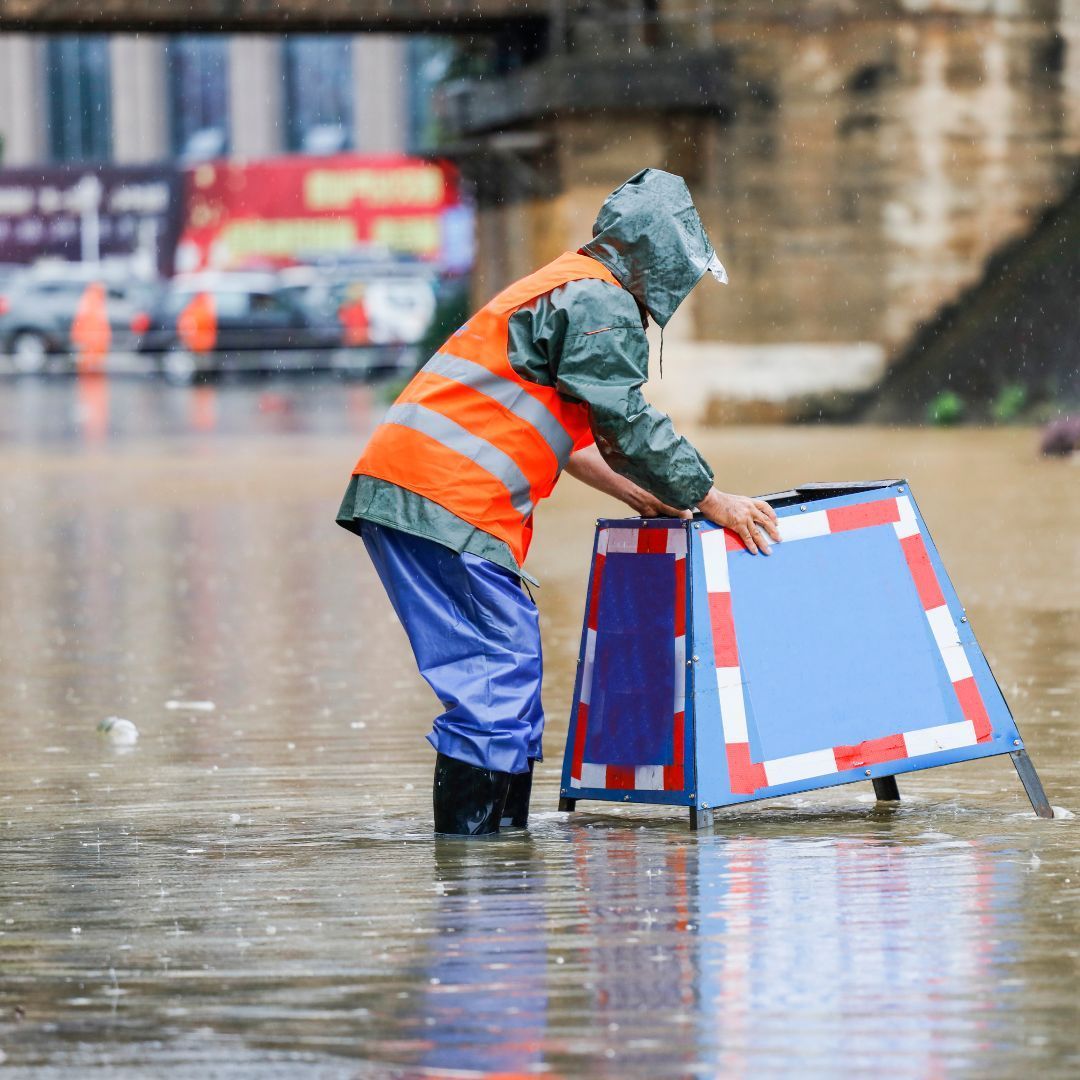Email us today!
How to Check if Your House is in a Flood Zone in Michigan
See How We're Different
or call us: (248)-647-2500
In 2022, there were significantly more daily temperature records set for warmth compared to cold. A total of 124,000 daily temperature records were matched or surpassed, with the warm records surpassing cold ones by a ratio of more than 1.5 to 1.
The average amount of precipitation across the contiguous United States in the same year was 28.35 inches, which was 1.59 inches lower than the average and placed it among the driest third in recorded history.
The average amount of yearly precipitation has increased globally and in the United States over land areas. From 1901 to the present, the average rate of increase in global precipitation has been 0.04 inches per decade, while in the contiguous 48 states of the United States, the average rate of increase has been higher at 0.20 inches per decade.
This means that many people take the risk of flooding lightly and do not believe it will ever affect them. Floods are often viewed as something that only happens to others and are only seen on the news.
Does Michigan Flood a Lot?
While Michigan is known for its abundant freshwater and vast landscape, it is also prone to flooding due to heavy rains and other natural disasters. Estimates show that a whopping 6% of Michigan's land is susceptible to flooding, which puts an immense 200,000 buildings at risk.
Michigan is also at risk of lakeshore flooding due to the fluctuating water levels in the Great Lakes. As a result, approximately 300 miles of the mainland shoreline along Michigan's Great Lakes is prone to coastal flooding.
What Are Flood Zones?
These are land areas that are considered at high risk for flooding. The Federal Emergency Management Agency (FEMA) identifies these zones and assigns them a letter designation (such as Zone A or Zone X) to indicate the level of risk. Every flood zone describes the likelihood of flooding, the depths and velocities of floodwaters, and other hazards associated with that area.
Depending on a property's location within a particular zone, its owners may be required to purchase special flood insurance or take certain precautions to protect their home or business. In addition, every resident of Michigan resides in a flood zone - it's just a question of whether one lives in a high, moderate, or low-risk area.
Understanding Flood Zones
Flood zones are typically named using alphabetical designations. Insurance companies utilize these labels in determining flood risks, as well as setting flood insurance rates and terms. In Michigan, the most common flood zone designations are as follows:
- Zone A - Zone A is considered the most common flood zone. If you reside in a Zone A area, it means that your home is located in a flood-prone region that is not close to the coast. There are five types of Zone A flood zones, and the type your home falls under will determine the cost of your flood insurance.
- Zone B - These areas have a moderate risk of flooding. They are close to rivers and other bodies of water, but the risk is lower than in Zone A.
- Zone C - Homes in zone C have a minimal risk of flooding. They are generally located further away from bodies of water and have a much lower chance of being affected by floods.
- Zone D - A designation of Zone D indicates that there is a likelihood of flooding in the area, but the exact level of the flood risk is not known.
- Zone V - Zone V is a flood-prone region along the coast with a high risk of flooding. It is regarded as a special hazard area.
- Zone X – On the most recent flood insurance rate maps, Zones B and C are newly recognized as Zone X.
Why Should You Check Your Flood Zone in Michigan?
Ignoring the possibility of a flood, even in areas with low statistical risk, is not recommended. A single severe storm can result in devastating consequences, wiping out possessions and properties within minutes. This is demonstrated by the California flood event of 2022-2023, which led to two fatalities, many rescued, and hundreds evacuated. It is important to take flood preparedness seriously, regardless of the location.
Flood risk is not limited to specific terrain types or locations. It can affect both rural and urban areas across Michigan, regardless of perceived low risk for a particular property.
Insurance companies are facing rising costs related to sewage backups as torrential downpours overwhelm the infrastructure in many cities.
If you live in a flood-prone area and feel at risk, consider purchasing flood insurance to protect your home from flooding and avoid costly damage due to heavy rains or other natural disasters. The first step is to find out if you reside in a flood zone.
Flood Zone Maps in Michigan
The United States government provides a free way to check if a property or house is in a flood zone. The primary source of flood maps is the Flood Insurance Rate Maps (FIRM) produced by the Federal Emergency Management Agency (FEMA).
You can access these maps from the (Federal Emergency Management Agency) FEMA website and zoom in on your property to determine its proximity to nearby bodies of water or areas prone to flooding.
Flood maps show which areas are prone to flooding when water levels rise. They show areas that are likely to experience floods if water rises to a specific level.
In addition, flood maps help homeowners and legislators make informed decisions regarding flood risk management, urban planning, and asset management.
How to Check If Your House is in a Flood Zone in A Few Minutes
In order to check whether your house falls within a flood zone in Michigan, you need to search for the address of your house on FEMA.gov, which is run and maintained by the United States government.
You will be provided access to the most up-to-date and accurate flood map near you, which can then quickly be exported as a PDF.
You can also try searching for the address of your house on other websites such as Google Maps and Bing Maps. These search engines will give you an idea about the area in which you live and the likely flood risk in your vicinity.
For vacant lots without a registered address, simply locate the closest property with an address and search for that one instead.
As a resident of Michigan, you can also use FloodTools.com to check whether your property is in a flood zone. This website is more user-friendly compared to other websites.
Floodtools.com displays an interactive map that immediately showcases flood zones with a red border. The site also offers incredible insight into the level of potential risk and associated losses through its menu located on the right side of the page, which includes information about average claims, active policies over time, and more!
With this data at your fingertips, you can make informed decisions to protect your family or business from flooding risks quickly and efficiently.
What to Do if My House is Located in a Flood Zone in Michigan?
If you establish that your house is located within a designated flood zone in Michigan, the first step is to contact an experienced insurance agent from Oakland Insurance to determine whether your assumptions are correct or incorrect.
These experienced insurance agents will deny or confirm whether it is a flood zone and explain the risk and the associated costs of obtaining coverage.
Oakland Insurance offers many options to protect your home and property from flood damage. These include policies, plans, and specialized coverage to address a wide range of flooding scenarios.
In addition, Oakland Insurance agents can provide guidance to take proactive steps such as installing sump pumps, raising the level of your house, adding flood vents, and other preventive measures.
Is a Property's Flood Zone Status Disclosed to Home Shoppers?
In the United States, no federal law mandates home sellers to reveal information regarding the flood hazard or any prior flood damage to potential home buyers. However, prudence dictates that home sellers in Michigan should still disclose information about a property's flood zone status to home shoppers.
Although it may not be required by federal law, transparency about potential flood risks can help build trust between buyers and sellers and ensure a fair and informed transaction.
In addition, it is always a good idea for home shoppers to research and ask the seller for any available information about the house's flood history.
Having Questions? Contact Oakland Insurance Today!
If you are not sure of how to check if your house is in a flood zone in Michigan or have any other questions, contact Oakland Insurance today. Our experienced insurance agents can provide you with the information and guidance you need to make an informed decision about purchasing property within a designated flood zone.
Furthermore, our team can also assist you with selecting and obtaining the appropriate insurance policies to cover your property in the event of a flooding disaster.
Let us help you make an informed decision about your home purchase!
BLOG AND NEWS
















